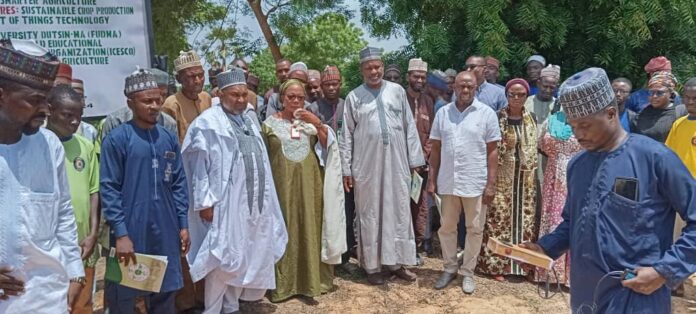By Abbas Bamalli
The Federal University Dutsinma (FUDMA), in Katsina State, has inaugurated a pilot project on smart agriculture, titled ‘’Smarter Agriculture: Sustainable Crop Production Using Internet of Things Technology (IoT)’.
The pilot project, under the FUDMA’s Faculty of Agriculture, is in collaboration with the Islamic World Educational Scientific and Cultural Organisation (ICESCO).
The Vice- Chancellor (V-C) of the university, Prof. Hamisu Armaya’u-Bichi, at the inauguration in Dutsinma on Tuesday said the project was introduced to reduce farmers’ challenges.
Armaya’u-Bichi said that in today’s rapidly changing world, traditional farming practices face many challenges, ranging from unpredictable weather to the need for greater productivity.
Represented by the Director, Academic Planning of the university, Prof. Alexander Bem-Adi, he said that there was the need to find new ways to sustain agricultural communities, adding that the initiative was an answer to the challenges.
According to him, smart agriculture leverages intelligent technologies like loT sensors, data analytics, and precision farming to transform how we farm.
”By using these advanced tools, we can optimise resources, reduce climate-related risks, and increase productivity.
”Our main goal is to revolutionise traditional farming. We want to empower our farmers to use these new technologies to optimise resources, manage risks, and boost productivity,” Armaya’u-Bichi said.
The vice-chancellor added that the initiative would serve as a model for smart agriculture that other countries could follow, paving the way for a more sustainable future.
He said that to achieve this, they would implement IoT sensor networks for real-time monitoring, better decision-making, and also improve efficiency.
”We will also focus on training and empowerment of both extension agents and local farmers, giving them the skills to use these technologies effectively.
“By evaluating the results of this pilot phase, we can develop scalable strategies for broader implementation,’ he said.
Meanwhile, Gov. Dikko Radda, represented at the event by the state’s Commissioner for Agriculture and Livestock, Prof. Ahmed Bakori, commended the development.
Radda said that as the project involved the use of drones, it would assist in reaching areas that were not motorable, as well as those cut-up from the main city when rain starts.
He said that the state government was fully committed to modern agriculture, revealing that recently, about 772 extension workers were recruited and equipped.
Similarly, Mr Bashir Ibrahim, Secretary General of the Nigerian National Commission for ICESCO (NATCOM-ICESCO), Federal Ministry of Education, said the project was part of a response to the profound transformation of the global agricultural landscape driven by technological advancements.
According to him, the project is designed to support member countries in harnessing the power of intelligent agriculture for enhanced productivity, sustainability, and economic outcomes.
”This initiative marks a significant milestone in our collective efforts to advance agricultural practices through innovative and sustainable methods.
”The project seeks to create a positive ripple effect on livelihoods, environmental sustainability, and food security. It is intended to serve as a testing ground shaping the future of smart agriculture on a larger scale,” he added.
NAN




